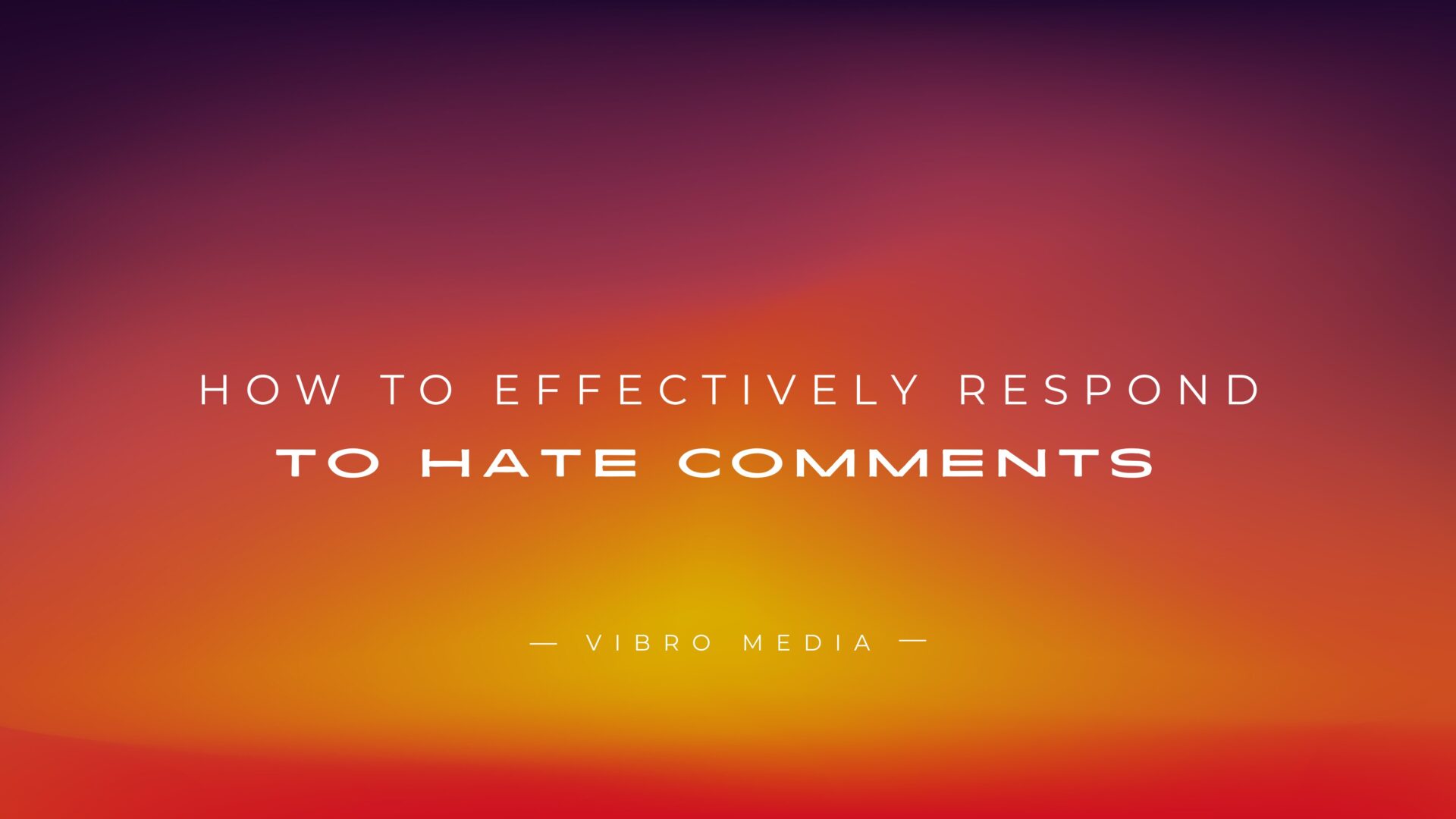Hate comments are an unfortunate but inevitable part of online interactions. Whether you’re a public figure, a business owner, or someone sharing their thoughts online, dealing with hate comments can be challenging. Understanding how to respond effectively is crucial for maintaining your mental well-being and reputation.
Understanding Hate Comments
Hate comments are aggressive and derogatory remarks intended to hurt, insult, or demean. They often stem from anger or insecurity and can target various aspects, from personal appearance to professional opinions. Recognizing the nature of these comments helps in crafting appropriate responses.
- Why Responding Matters
Responding to hate comments isn’t just about defending yourself; it’s about maintaining control over your narrative. A well-thought-out response can defuse tension, clarify misconceptions, and even turn a negative interaction into a positive one.
Types of Hate Comments
- Personal Attacks
These comments focus on personal attributes or characteristics, aiming to belittle or insult. They might involve name-calling or mocking one’s appearance, background, or abilities.
- Discriminatory Remarks
These involve hate speech based on race, gender, religion, or other personal identifiers. Such comments are particularly harmful and require a careful approach to address.
- Spreading Misinformation
Sometimes, hateful comments are fueled by false information or misconceptions. Addressing these involves clarifying facts and correcting falsehoods without escalating the situation.

200+ Responses To Hate Comments
Defensive
- I don’t think you understand the full context of my comment. Here’s what I meant…
- It seems like my words were misinterpreted. I stand by my point, but I see where you might have gotten confused.
- I feel like my message is being taken out of context. Here’s the full picture.
- I can see why you might be upset, but let me explain why I said what I did.
- I stand by what I said, but I’m open to discussing it further if you have questions.
- I think there’s been a misunderstanding. Let me clarify my position.
- I’m not sure where the confusion comes from, but I’m happy to explain further.
- It seems like my comment has been misunderstood. I’m just trying to share my perspective.
- I didn’t mean to offend anyone. My comment was meant to be interpreted differently.
- I can see why you’re upset, but I want to clarify that my intent was not to hurt anyone.
Constructive
- I appreciate your feedback. How about we discuss this further to find a common ground?
- Thanks for sharing your thoughts. Let’s focus on how we can improve this situation together.
- I see where you’re coming from. Let’s explore ways we can address this issue constructively.
- Your feedback is valuable. Let’s use it to make positive changes and improve our discussion.
- I appreciate your perspective. Let’s work together to find solutions for both of us.
- Thank you for your input. Let’s collaborate to address the concerns you’ve raised.
- I understand your concerns. Let’s discuss potential improvements and solutions.
- I value your feedback. How can we address this issue to benefit both of us?
- Let’s use this to build a better understanding and improve our communication.
- I appreciate your constructive criticism. Let’s work on finding a solution that resolves this.
Empathetic
- I’m sorry to hear that my comment upset you. I can understand why you feel that way.
- I see that this issue is important to you. I’m here to listen and understand your perspective.
- I’m sorry if my words hurt you. That wasn’t my intention, and I appreciate your honesty.
- I understand why you’re upset. Let’s talk about this and work through it together.
- I’m genuinely sorry for any distress my comment may have caused. Let’s address this with empathy.
- I hear you, and I’m sorry for any misunderstanding. Your feelings are valid and important.
- I can see why you might be feeling this way. Let’s work together to resolve any issues.
- I’m sorry if my message came across the wrong way. I value your perspective and want to understand it better.
- I understand that this might be upsetting. Let’s discuss how we can move forward in a supportive way.
- I’m sorry for any confusion or hurt my comment may have caused. Let’s address this with care and understanding.
Humorous
- Well, that escalated quickly! Let’s try to keep things light and laugh it off.
- Looks like my comment struck a nerve! Let’s turn this into a joke and move on.
- I didn’t mean to ruffle feathers—just trying to add some spice to the conversation!
- Who knew my comment would cause such a stir? Let’s all take a deep breath and chuckle about it.
- I guess my sense of humor didn’t quite land. Let’s agree that we can laugh about this and move on.
- I didn’t realize my comment would spark such a reaction. How about we find the humor in this and keep it light?
- Seems like my attempt at humor didn’t go as planned. Let’s laugh it off and enjoy the conversation.
- Looks like my comment hit a nerve! Let’s try to see the funny side and keep things upbeat.
- Guess my sense of humor is a bit off today! Let’s take a step back and have a laugh about it.
- I didn’t mean to upset anyone—just trying to lighten the mood. Let’s move past this with a smile.
Direct
- I don’t agree with your point. Here’s why I think differently.
- I understand your perspective, but I stand by my comment. Here’s my reasoning.
- I see where you’re coming from, but my view differs. Let’s discuss it directly.
- I appreciate your feedback, but my position remains the same. Here’s why.
- I understand your concerns, but I’m not changing my stance. Here’s my perspective.
- I respect your opinion, but I have a different take. Let’s discuss our differences openly.
- I don’t share your view, but I’m open to discussing it further if you’d like.
- I hear your feedback, but my viewpoint is different. Here’s my reasoning.
- I understand your point, but I disagree. Let’s address this directly and move on.
- I appreciate your input, but I’m sticking to my original comment. Here’s my explanation.
Educational
- I think there’s some misunderstanding here. Let me explain the context behind my comment.
- It might help to know that this topic involves [provide background information]. Here’s a bit more about it.
- To clarify, the concept I mentioned is based on [provide educational details]. Let’s dive into it a bit more.
- I understand this might be confusing. Here’s a brief overview of the topic to provide some context.
- Let me give you a bit of background on this subject. It might help clarify my point of view.
- I can see why this is unclear. Here’s a bit of information that might help explain my comment.
- To better understand my perspective, let’s look at some background on [related topic].
- This topic can be complex. Here’s a quick explanation to help clarify my comment.
- I appreciate your feedback. Let me provide some context to explain my point better.
- It seems there’s a bit of confusion. Here’s some educational context that might clarify my comment.
Apologetic
- I’m sorry if my comment came across the wrong way. That was not my intention at all. Let’s clear this up.
- I apologize if I’ve offended you. I value your feedback and would like to make things right if possible.
- I’m sorry if my words hurt you. I didn’t mean to cause any distress, and I hope we can resolve this.
- I regret if my comment seemed insensitive. I appreciate your perspective and am sorry for any upset caused.
- It was never my intention to upset anyone. I’m sorry if my post did that. Let’s work through this together.
- I’m sorry for any confusion or hurt my comment may have caused. Your feelings are important to me.
- I’m genuinely sorry if my message was offensive. I’m here to listen and understand where you’re coming from.
- If my comment came off as rude, I apologize. That wasn’t my intention, and I appreciate your patience.
- I’m sorry for the misunderstanding. I hope we can address any issues and move forward positively.
- My apologies if my post wasn’t clear or if it upset you. I’d like to make amends if I can.
Avoidant
- I’m going to step back from this conversation. Let’s focus on more positive and constructive discussions.
- I prefer not to engage in this discussion further. Thanks for your understanding.
- This seems to be turning into a heated debate. I’m going to avoid this topic for now.
- I’d rather not continue this conversation. Let’s move on to something more productive.
- I’m not going to respond further on this matter. I appreciate your understanding.
- I think it’s best to drop this subject and focus on something else.
- I’m choosing to disengage from this discussion. Thanks for your input.
- I’d prefer not to continue this dialogue. Let’s shift our focus to a more positive topic.
- This topic seems to be causing a lot of friction. I’m stepping away from this discussion now.
- I’m going to avoid further discussion on this issue. Let’s keep the conversation respectful and constructive.
Redirection
- I understand your concerns, but let’s focus on finding a solution together. How about we discuss this offline?
- I see you’re upset. How about we talk about this in a more private setting to resolve it?
- Let’s focus on something that can help us move forward. How do you feel about discussing [related topic] instead?
- I hear your feedback, but I think addressing this through a different channel is better. Can we take this conversation to messages?
- I understand where you’re coming from. Maybe we can talk more about this privately to work things out.
- Let’s redirect this conversation to a more productive discussion. I’m open to discussing [related topic] if you’re interested.
- I see this is a sensitive topic. How about we move the discussion to a private forum to sort this out?
- I’d like to shift our focus to finding a constructive solution. Let’s discuss how we can improve things together.
- Let’s pivot to a different aspect of this issue that we can work on. How does [related topic] sound?
- I think it’s best if we handle this matter privately. Let’s continue this conversation in a more appropriate setting.
Supportive
- I understand that this topic is important to you. I’m here to support you and listen to your concerns. How can we address this together?
- I appreciate your passion on this issue. Let’s work together to find a solution that respects our views.
- I can see why this is upsetting. I’m here to support you and help address any issues you might have.
- Your feelings are valid, and I’m here to offer support. Let’s talk about how we can move forward positively.
- I know this is a challenging topic. I’m here to listen and support you in finding a way to address it.
- I understand this is a sensitive subject. Let’s work through it together and find a constructive way to handle it.
- I appreciate you bringing this up. I’m here to support you and help find a resolution that works for both of us.
- I’m sorry to hear that you’re upset. Let’s focus on supporting each other and finding common ground.
- I hear you and understand where you’re coming from. Let’s work together to find a positive way forward.
- Your perspective is important, and I’m here to support you. Let’s discuss how we can address this issue constructively.
Clarifying
- I see there might be some confusion. Let me clarify my point to help us better understand each other.
- I think there’s been a misunderstanding. Here’s what I meant by my comment to clear things up.
- Let me explain a bit more about my position. I hope this helps clarify my perspective on the issue.
- I understand there’s some confusion. Here’s a detailed explanation of my viewpoint to help clarify things.
- It seems like there might be some miscommunication. Let me provide more context to clarify my stance.
- To clear up any confusion, here’s a more detailed explanation of what I meant.
- I think there’s been a mix-up. Here’s some additional information to clarify my point of view.
- Let me clarify my previous comment to ensure we’re on the same page.
- I understand this might be unclear. Here’s a breakdown of my thoughts to help clarify.
- I see where there might be some confusion. Let me explain further to make my point clearer.
Assertive
- I appreciate your input, but I stand by my original comment. Let’s agree to disagree and move on.
- I understand your perspective, but I firmly believe in my position. We can respectfully agree to disagree.
- My stance on this issue is clear, and I’m not changing it. I respect your opinion, but I’m sticking with mine.
- I’ve made my point, and I stand by it. If you have further concerns, we can address them, but my position remains the same.
- I’ve considered your feedback but am confident in my perspective. Let’s move forward with mutual respect.
- I hear what you’re saying, but I’m firm in my beliefs. Let’s discuss other topics where we might find common ground.
- My opinion on this matter is final. I appreciate your views, but I won’t be changing mine.
- I understand that we disagree, but I stand by my original statement. Let’s respect each other’s viewpoints.
- I’m confident in my stance and believe it’s valid. We can continue to disagree respectfully and move on.
- I acknowledge your feedback, but my position is firm. Let’s focus on constructive discussions moving forward.
Inspirational
- I believe that every challenge can lead to growth. Let’s turn this negative energy into something positive and uplifting.
- Sometimes the most difficult conversations lead to the greatest personal growth. Let’s use this moment to learn and evolve.
- Your feedback is an opportunity for us to rise above and improve. Let’s approach this with an open heart and mind.
- Every experience, even the tough ones, can be a chance to inspire change. Let’s make the most of this situation.
- When faced with negativity, we can choose how we respond. Let’s choose positivity and constructive dialogue.
- I see this as a chance to grow and improve together. Let’s turn this into a positive learning experience.
- Even in challenging times, we have the potential to inspire each other. Let’s use this opportunity to uplift one another.
- Your comment is a chance for reflection and improvement. Let’s rise to the occasion and turn this into a valuable lesson.
- Great things can come from adversity. Let’s use this moment to motivate each other and strive for better.
- Every setback can be a setup for a comeback. Let’s take this opportunity to grow and move forward with renewed strength.
Philosophical
- In the grand scheme of things, our differences are small compared to the bigger picture. Let’s approach this with a broader perspective.
- Sometimes conflict can lead us to deeper understanding. Let’s view this as an opportunity for philosophical growth and reflection.
- Every interaction, even a challenging one, can be a chance to explore the nature of human connection and understanding.
- Our experiences shape our perspectives, and every debate is a chance to expand our philosophical horizons.
- In the grand tapestry of life, each disagreement can contribute to our overall wisdom. Let’s embrace this as a learning moment.
- This situation reminds us of the complexity of human nature. Let’s reflect on how we can better understand and connect.
- Every interaction is a chance to ponder deeper truths about human nature and our place in the world. Let’s use this moment for philosophical exploration.
- Conflict often reveals underlying truths about ourselves and others. Let’s approach this with a mindset of philosophical inquiry.
- Consider this disagreement a chance to delve into the complexities of human perspective and mutual understanding.
- In the larger context of life, every challenge can be a lesson in the art of human coexistence and philosophical growth.
Personal Growth
- I see this as a chance for personal growth. Let’s use this experience to reflect on improving and better understanding each other.
- Every challenge is an opportunity to grow. Let’s take this moment to evaluate and grow from our perspectives.
- I believe that even difficult interactions can lead to personal development. Let’s use this experience to become better individuals.
- This situation is a chance for both of us to reflect on our personal growth and how we handle conflict.
- Every experience, even the tough ones, can contribute to our growth journey. Let’s approach this with an open mind.
- I see this as an opportunity to improve my growth and understanding. Let’s both use this moment to learn and evolve.
- This is a chance to reflect on how we handle criticism and to grow from it. Let’s focus on personal development through this experience.
- I view this as a moment for self-improvement and personal growth. Let’s both strive to learn from this and become better individuals.
- Conflict can be a catalyst for personal growth. Let’s use this opportunity to reflect on our responses and how we can improve.
- I believe every interaction, even challenging ones, can foster personal growth. Let’s embrace this chance to reflect and grow.
Grateful
- Thank you for sharing your thoughts. Even if critical, your feedback is valuable and helps me grow.
- I appreciate your comment. I need to hear different perspectives, and I’m grateful for your input.
- Thanks for taking the time to express your feelings. I value your feedback and will consider it in future discussions.
- I’m grateful for your response. It’s helpful to see where others are coming from, and I appreciate your perspective.
- Thank you for your feedback. Even though we don’t see eye to eye, I appreciate the chance to hear your thoughts.
- I value your input and am thankful for the opportunity to address your concerns. It’s important to me to understand different viewpoints.
- Thank you for engaging in this conversation. Your perspective is important, and I appreciate the opportunity to consider it.
- I’m grateful for your comment. It helps me see things differently and improves my understanding.
- Thank you for sharing your perspective. I appreciate the dialogue and am thankful for the chance to discuss this.
- I appreciate your feedback and the opportunity to address your concerns. Thank you for contributing to this discussion.
Polite Disagreement
- I understand where you’re coming from, but I have a different perspective. Let’s agree to disagree on this matter.
- I appreciate your viewpoint, but I see things differently. It’s okay for us to have differing opinions.
- Thank you for sharing your thoughts. While I respectfully disagree, I’m glad we can have this conversation.
- I see your point, but my view is different. Let’s acknowledge our differences and move forward respectfully.
- I understand your position but have a different take on this. It’s perfectly fine for us to disagree.
- I appreciate your perspective, though I don’t share the same view. Let’s continue this discussion with mutual respect.
- Thank you for expressing your opinion. I see things differently, but I respect your right to your viewpoint.
- I hear what you’re saying, but I disagree. It’s okay for us to have different opinions on this issue.
- I understand your point of view, but my perspective differs. Let’s approach this with respect for each other’s opinions.
- While I value your opinion, I have a different perspective. Let’s agree to disagree and keep the conversation respectful.
Clarification of Intent
- I think there might have been a misunderstanding. My intention was actually to [clarify the intent].
- I’m sorry if my comment wasn’t clear. What I meant to convey was [explain the intended message].
- It seems my words may have been misinterpreted. My actual intent was to [provide clarification].
- I want to clarify that my comment was meant to [explain the purpose]. I didn’t mean to upset anyone.
- I apologize if my intention wasn’t clear. I was trying to [provide the intended message].
- I see there’s been some confusion. I aimed to [explain the original intent], and I hope this helps clarify things.
- It seems my message might have been misunderstood. What I intended to say was [clarify the message].
- I’m sorry if my comment came across differently than intended. My goal was to [explain the purpose behind the comment].
- I’d like to clarify that my intent was [provide clarification]. I didn’t mean to cause any confusion or hurt.
- It appears there’s been a misinterpretation. I intended to [explain the original intent], and I hope this clears things up.
Encouraging Dialogue
- I appreciate your feedback and would love to understand your perspective better. Let’s have a constructive discussion about this.
- I see we have different views on this. Let’s discuss further to find common ground and understand each other’s viewpoints.
- Your comment raises important points. I’m open to a dialogue to explore this topic more deeply. What are your thoughts?
- I value open conversations and want to hear more about your perspective. Let’s discuss this in more detail.
- Let’s use this as an opportunity for a meaningful discussion. I’m interested in hearing more about your views and sharing mine.
- I think there’s a lot we can learn from each other. Let’s keep the dialogue going to understand our different perspectives better.
- Your feedback is important, and I’d like to continue this conversation to address any misunderstandings and find common ground.
- I’m interested in exploring this topic further with you. Let’s keep the lines of communication open and have a constructive discussion.
- Let’s approach this conversation with an open mind. I’m keen to understand your perspective and share my insights.
- I appreciate your input and believe a thoughtful dialogue could benefit. Let’s discuss this further to find mutual understanding.
Protective
- I want to maintain a respectful and safe space for everyone involved. Let’s focus on constructive discussion.
- I’m here to support a positive conversation and ensure that all voices are heard respectfully. Let’s address this in a considerate manner.
- Handling this situation with care and respect for all parties involved is important. Let’s aim for a constructive and respectful exchange.
- I want to make sure that everyone feels heard and respected. Let’s address concerns in a way that maintains a positive environment.
- I’m committed to fostering a respectful discussion. Let’s keep our conversation constructive and focused on mutual understanding.
- It’s crucial to protect the integrity of this discussion by ensuring it remains respectful and constructive. Let’s work towards that.
- I’m here to help maintain a positive and supportive dialogue. Let’s address issues with empathy and respect for everyone’s perspective.
- Protecting a respectful and safe dialogue is important. Let’s ensure that our conversation remains constructive and inclusive.
- I want to safeguard the integrity of our discussion and ensure that it remains respectful. Let’s approach this with consideration for all viewpoints.
- Ensuring a respectful and supportive dialogue is my priority. Let’s focus on maintaining a positive exchange of ideas and perspectives.
Initial Reactions
- Take a Deep Breath
Before you respond, take a moment to compose yourself. Reacting impulsively can escalate the situation and lead to more negativity.
- Assess the Situation
Evaluate the comment to determine its intent and severity. Not all hate comments require a response; some are best left ignored.
- Avoid Immediate Response
Give yourself time to think about your response. Immediate reactions can be emotional and may not always reflect your best judgment.
Crafting Your Response
- Stay Calm and Objective
When you decide to respond, ensure your tone is calm and neutral. Avoid matching the aggressiveness of the hate comment.
- Use Constructive Language
Frame your response in a way that promotes understanding and resolution. Constructive language helps in addressing the issue without fueling further animosity.
- Address the Issue, Not the Person
Focus on the content of the comment rather than attacking the individual. This approach helps in keeping the conversation civil.
- Keep It Short and Sweet
A concise response is often more effective than a lengthy explanation. It gets your point across without giving too much attention to the negativity.
When to Ignore
- Identifying Trolls
Some individuals thrive on provoking reactions. If it’s clear that the comment comes from a troll, it might be best to ignore it and avoid giving them the attention they seek.
- Assessing the Impact
Consider whether responding will have a positive effect or if it might escalate the situation. Ignoring comments unlikely to contribute to a constructive dialogue can be a wise choice.
Handling Hate Comments on Different Platforms
- Social Media
Social media platforms often have tools for reporting and blocking users. Utilize these features to manage hate comments effectively.
- Blogs and Forums
Moderators can help manage comments on blogs and forums. Engage with these platforms’ tools to handle hate comments appropriately.
- Professional Websites
For professional sites, maintaining a professional tone in responses is key—address hate comments with a focus on facts and professionalism.
Building a Positive Online Presence
- Engaging with Supporters
Interacting positively with supporters can create a buffer against hate comments. Building a supportive community helps in balancing negative interactions.
- Sharing Positive Content
Regularly share content that reflects your values and positive aspects of your work. This helps promote a positive image and dilute the impact of hate comments.
- Implementing Effective Moderation
Effective moderation policies help manage comments and ensure that hate comments are handled swiftly and appropriately.
Tools and Strategies
- Using Comment Moderation Tools
Many platforms offer tools to filter and moderate comments. Leveraging these tools can help manage and reduce the visibility of hate comments.
- Employing Conflict Resolution Strategies
Develop strategies for conflict resolution that can be applied in responses. Techniques like active listening and empathy can be valuable.
Seeking Help and Support
- When to Consult a Professional
If hateful comments affect your mental health or professional life, consulting a counselor or legal professional may be necessary. They can guide managing the situation effectively.
- Utilizing Support Networks
Contact support networks, including friends, family, or online communities. Sharing your experiences can provide emotional support and practical advice.
Conclusion
Navigating the world of online hate can be challenging, but with the right approach, you can turn negativity into an opportunity for growth and positive interaction. By implementing the strategies and replies we’ve outlined, you can handle hate comments gracefully and assertively, preserving your mental well-being and maintaining a respectful online presence. Remember, responding thoughtfully diffuses conflict and sets a powerful example for others. For more insights on dealing with specific types of comments, Check out our guide on:
How to Handle “You’re So Skinny” Comment: 200+ Replies
FAQs
Q. How can I identify a genuine hate comment?
Genuine hate comments are usually aggressive, derogatory, or discriminatory. They often aim to provoke an emotional response rather than contribute to a constructive dialogue.
Q. What if my response provokes more hate?
If your response leads to further hostility, it’s often best to disengage. Focus on managing the situation calmly and consider using moderation tools to handle continued negativity.
Q. How do I handle hate comments from someone I know personally?
Respond with professionalism and objectivity. If the comments are deeply hurtful, consider discussing the issue privately with the individual or seeking mediation.
Q. Are there legal actions I can take against persistent hate comments?
Yes, in severe cases, legal action may be an option. Consult with a legal professional to explore your options based on the nature of the comments and their impact.
Q. How can I protect my mental health while dealing with hate comments?
Limit your exposure to negative comments, engage in positive online interactions, and seek support from friends or mental health professionals to maintain your well-being.











Excellent blog here Also your website loads up very fast What web host are you using Can I get your affiliate link to your host I wish my web site loaded up as quickly as yours lol
BaddieHub Great information shared.. really enjoyed reading this post thank you author for sharing this post .. appreciated
Tech to Trick I appreciate you sharing this blog post. Thanks Again. Cool.